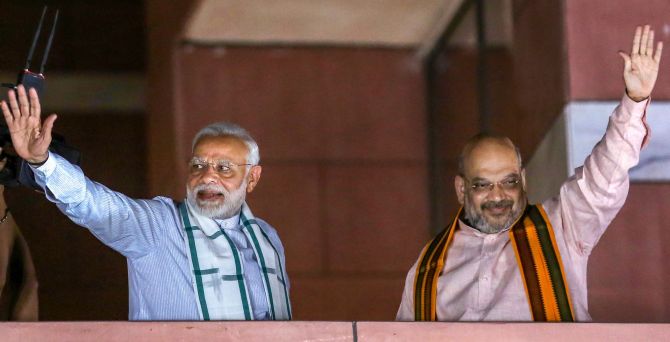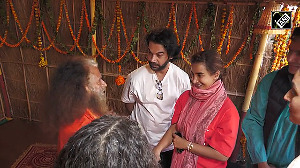'Both Modi and Shah know the importance attached by Lord Krishna in the Bhagavad Gita to self-introspection (swadhyay) as one of the virtues of wise leaders.'
'From the way both leaders are painting the BJP's performance in the Karnataka election, one can only conclude that they have flunked Lord Krishna's test,' says B S Raghavan, the distinguished civil servant.

IMAGE: Prime Minister Narendra D Modi and Bharatiya Janata Party President Amit A Shah wave to party workers gathered at the BJP headquarters after the Karnataka assembly election result, May 15, 2018. Photograph: PTI Photo
It is entirely natural for the Bharatiya Janata Party to seek to put the best face on its failure to win a majority in the Karnataka election, and turn the tables on the Congress by making much of its downslide from the 122 seats it held in the outgoing state assembly to 77 elected to the present assembly.
As disciples of the Rashtriya Swayamsevak Sangh, both Narendra D Modi and Amit A Shah would have known the importance attached by Lord Krishna in the Bhagavad Gita to self-introspection (swadhyay) as one of the virtues of wise leaders.
True introspection means being honest to oneself and unsparing in looking for and rectifying mistakes committed in one's actions.
From the way both leaders are painting the BJP's performance in the Karnataka election, one can only conclude that they have flunked Lord Krishna's test.
Up until the moment it became clear that the BJP wasn't going to secure a majority, BJP leaders had been projecting the state as the gateway to the south for the party, and were in no doubt about its sweeping the state thanks to the Modi magic.
B S Yeddyurappa, the one whom the party had proclaimed to be the chief minister-designate, had even announced that his swearing-in ceremony would be held on May 17.
Sweets had been thrust into each other's mouth and firecrackers had been set off in anticipation of assumption of office of a BJP government in its own right.
Alas, something went awry.
The electorate of Karnataka tantalisingly gave the BJP a head start at the early stages of the counting, taking the tally temptingly forward as if to cross the half-way mark, but stopping it 8 seats short.
With a total of 115 seats between themselves, the Indian National Congress and the Janata Party-Secular would have been foolish if they did not quickly forge an alliance and claim the right to be invited to form the government.
But why did the people of Karnataka leave the BJP dangling, I almost said twisting, like this, even in a worse state than in 2008 (when the BJP got 110 seats with no Modi)?
Unless at least among the leaders of the party's inner circle, there is a ruthless dissection of the possible factors, it will come to grief, backslide in the coming polls and be unable to make real its dream of having all the states of India in the bag.
The first and foremost among them -- yes, you, I, and everyone, but the BJP, guessed it right -- is the Yeddyurappa factor.
Politicians everywhere are in foul odour as regards personal integrity, but in Karnataka, it is difficult at the present time to imagine anyone more tainted than Yeddyurappa.
As one report put it, 'His term as the chief minister of the first BJP government in the south was littered with investigations, allegations and rumours of brazen and relentless graft.'
Still the BJP was reluctant to ask him to quit.
It was only when the Lok Ayuktha in 2011 came up with a litany of corruption charges against him, including illegal mining and land grabbing and misuse of his office to make prime property available to his children and their spouses at absurdly low prices that the BJP was forced to ask him to resign.
It was followed by his arrest and being sent to jail custody.
Around that time, while on a tour to promote clean governance, L K Advani himself had openly demanded of the BJP to deal with corruption among its own if it wanted to convince the people that it had the right to take on the Congress over corruption.
One can understand Amit A Shah overlooking such a background of a person touted as the chief minister, because the commonly held view that he is prepared to take a flexible and accommodating view of such misdeeds.
But how could Narendra D Modi, thundering at every nook and corner of the country against corruption, black money and scams right from the moment of his advent on the national political stage, so unabashedly come to terms with his conscience in acquiescing in the anointment of Yeddyurappa as the chief minister?
If the Karnataka electorate was considerate enough not to have rejected the BJP on this one count alone and saved Modi's face by making it the single largest party, it was because of the lingering faith it still had in Modi's capacity to correct himself.
The second cause of the state electorate being in two minds about the BJP could be the bad memory people still have of excesses of moral policing and socially disruptive, and potentially divisive, activities of fanatical, fringe elements, and the apparent indulgence they received from local politicians, and even the administration.
The third, to my mind, is that the mindset of the central figures of the BJP is still that of backwoodsmen predominantly weighed down by the reflexes and complexes governing northern states, with little awareness of the sensibilities and susceptibilities of the people of the south, and uncomfortable in any language other than Hindi.
I am a Visharad in Hindi with a published book of Hindi poems under my belt and was a volunteer in the cause of propagation of Hindi at the turn of Independence, but even I find their flaunting of Hindi irritating.
So long as this miasma of north Indian-ness sticks to them, they may not find ready or willing acceptance.
All these reservations are reflected in the vote share of the BJP which has continued to lag behind that of the Congress which got 35.13, 36.6 and 37.9 per cent as against the BJP's 33.26, 19.9 and 36.2 per cent in the elections of 2008, 2013 and 2018 respectively.
Karnataka thus was no great shakes for the BJP at any time, and it will have to demonstrate its earnestness and sincerity in remedying its deficiencies and drawbacks before it can hope to make headway not only in Karnataka, but anywhere else in the south.
B S Raghavan, a retired member of the Indian Administrative Service, is an author and political and economic columnist of note.






 © 2025
© 2025